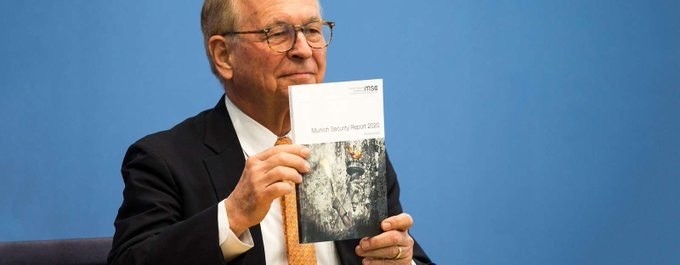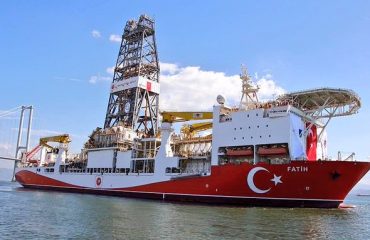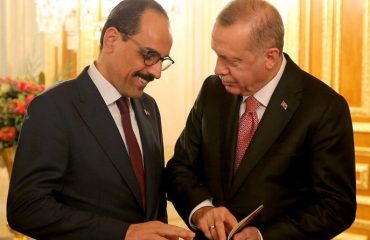

The mind opening term of the “Westlessness” is the theme of the 2020 Munich Security Conferences (MSC) on February 14-16.
It’s the “Decay of the Western project” elaborates Ambassador Wolfgang Ischinger, the Chairman of the Munich Security Conferences in the report (*) with the same title of Westlessness; “today the West as we know is contested both from within and without”. He also says that in the 56th of the annual conferences “revisiting the Western project” would be discussed together with international peace and security issues.
To endorse Ischinger’s point, a Conference-related example could be given. Turkish National Defence Minister Hulusi Akar who was in NATO Defense Ministers’ meeting in Brussels the other day was scheduled to be in Munich for the Conferences together with Turkish Foreign Minister Mevlüt Çavuşoğlu. But now he will be in Pakistan together with President Tayyip Erdoğan to sign new military cooperation agreements, including sale of attack helicopters and drones. Preferences are no longer only Western-oriented.
But what is the meaning of the West in politics? It is not only related related with geography doesn’t mean geography only. In the report the criteria to be a part of the “West” are is summarized under three topics: 1- Commitment to the liberal democracy and human rights, 2- A market-based economy, 3- International cooperation in international institutions.
That is the point where a set of questions need to be asked: Is the world becoming less Western? Is the West itself becoming less Western, too? What does it mean for the world if the West leaves the stage to others? What could a joint Western strategy for an era of great power competition look like? And if so, are we witnessing the end of globalism and rise of nation states and religious and ethnic values again? Will that mean playing the global game with disappearing rules and references, which can bring real chaos?
Illiberal anti-globalism on rise
Those questions are legitimate, because, for example the leader of the biggest economic and military power of the world, the U.S. President Donald Trump said in his speech in the UN General Assembly in 2019 the following: “The future does not belong to globalists. The future belongs to patriots.”
Russian President Vladimir Putin was more direct in 2019, as always: “Liberal idea has become obsolete. It has come to conflict with the interests of the overwhelming majority of the population.”
In a conference in Ankara in 2019, Russian historian Andrei Fursov said that what was the only point in common of the though leaders of the world from Trump to Putin, from Modi of India to Erdoğan of Turkey, from British PM Johnson to Chinese President Xi and Abe in Japan was neither populism, nor autocracy, nor fascism but anti-globalism.
Victor Orban, the leader of Hungary, a member of the European Union (EU) supposed to be the bastion of the Western “project”, said the following back in 2018: “Liberal democracy is in favour of multiculturalism, while Christian democracy gives priority to Christian culture; this is an illiberal concept. Liberal democracy is pro-immigration, while Christian democracy is anti-immigration; this is again a genuinely illiberal concept. And liberal democracy sides with adaptable family models, while Christian democracy rests on the foundations of the Christian family model; once more, this is an illiberal concept. […] We can wave goodbye not only to liberal democracy and the liberal non-democratic system.”
In Turkey, President Tayyip Erdoğan, under Western criticism of being autocratic, called on Muslims to stand up against attacks on Islam and slammed the West for holding Muslims accountable for terrorism and fueling hatred, in a 2018 conference in Istanbul. He also said in that [the West] “got used to the policy of enslavement and do what they are told. We don’t live in the post-World War II period anymore. We need to build a new World.”
Another example for pronouncing the decay of the West as it is known came from the French President Emmanuel Macron, who said the Western defense organization NATO is suffering a “brain death”.
West is descending but is East ascending?
At first sight the answer is, yes. But as we scratch the surface another reality emerges. For example, coronavirus delivered a heavy blow to China’s glamor; more than one thousand people died in desperation, according to official figures and the cost of it to Chinese economy in the same period is estimated as $1.,5 trillion. Quick growth in lack of pluralist texture, makes the system fragile.
Russia with its incredible diplomatic capacity in playing a weak hand as effective as possible, is a global power in military terms but only a middle class, regional power when it comes to economy. India is an ascending economy but with the cost of terrible environmental problems on top of climate disasters. Japan is still the third largest economy, but the perception of threat from China and North Korea binds the country militarily and politically to the U.S.
Half of the ten conflict potentials to be watched in 2020, according to the MSC report are in the Middle East and Africa countries, and that excludes the chronical civil war in Syria. The West, especially the EU has proven weak in the Syria crisis, and recently on Libya.
The EU is an economic giant but has no quick response capacity when it comes to cope with the quickly changing political and social environment. Its unanimous vote rule seems to bring more problems in future, following the Brexit, which meant the first split, and a big one with the loss of the UK. It could be a much bigger disaster if something like coronavirus would emerge in Europe, instead of the communist-party-ruled China. The rise of the extreme-right has already started to take its toll in settled democracies of Europe, like in Germany.
Westlessness in the heart of the West
It is a courageous step for the MSC to discuss where the West is going of has already gone in Munich, at the very heart of Europe.
The fact that it is open to debate of decision makers on international politics from all over the world, is also an indication of the world being at the threshold of dramatic changes. The brinkmanship and military moves have already started to take the place of diplomatic niceties and fair play in international relations. That could also mean that the international relations and economy are heading for a state of lesser references and law-based rules. Yet, all foreign policy and defense actors of the world politics are expected to be in Munich to give another chance for dialogue at a time when the number of hot spots is growing from the Middle East to South East Asia.
YetkinReport readers will be able to get timely news and analysis about the shifting tendencies in world politics, thus economy from the Munich Security Conference with exclusive reporting.
(*) You can download the report by clicking here.


